Relationship Spread #1
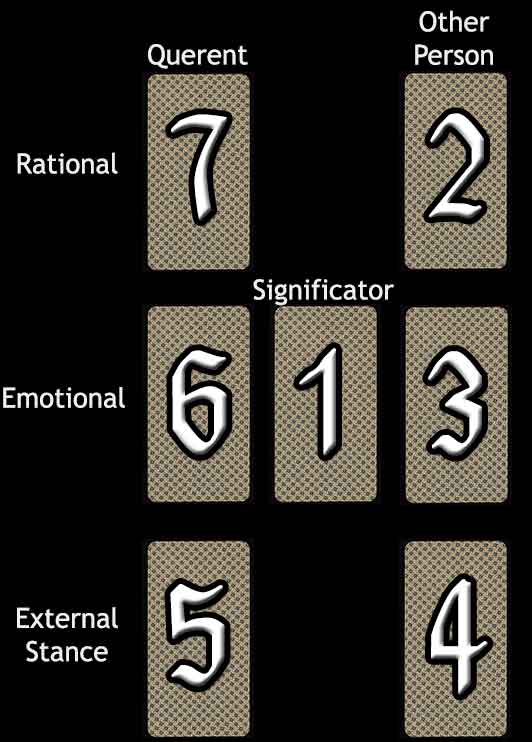
Difficulty: Easy
This tarot spread is easy to read, like a convenient chart. In this spread, court cards generally indicate actual people with the same characteristics. Knights (or corresponding princes, but not kings) and queens are meant to represent actual men and women in this tarot spread. Look for patterns in the cards as always.
Card #1 is the overall significator of the relationship. The two columns on either side of the significator characterise each individual's role in the relationship. The relationship does not have to be romantic. In fact, it could be a relationship between a person and a group, or even how two groups relate.
The top row, cards #7 & #2, is about the conscious thoughts of each person, or what they think about the relationship and likewise how they view their partner.
The middle row, cards #6 & #3, reveals the way each individual feels about the other. Emotional awareness corresponds to a person's unconscious thoughts that run deep, affecting a person in ways he or she is not fully aware of.
The bottom row, cards #5 & #4, represents the way each person behaves, in other words the stance taken regarding the relationship. The way a person acts may be genuine, but sometimes people are phony and manipulative, so it is best to weigh this card against the other person's cards to determine how they match up.
Your Relationship #1 Reading
| You | Other Person | ||
| Thought | 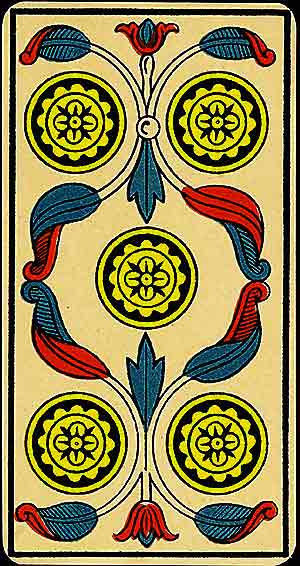 Five of Coins |
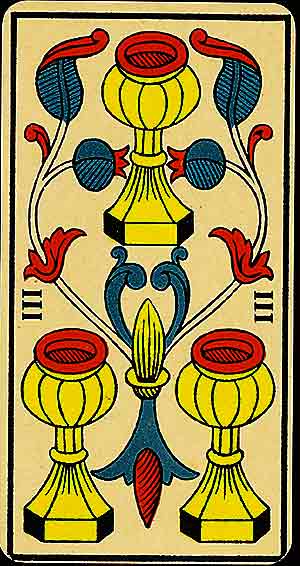 Three of Cups |
|
| Emotion | 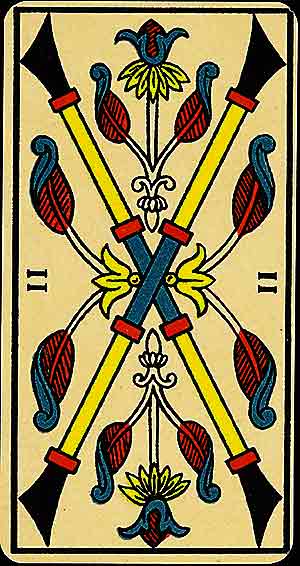 Deuce of Batons |
The Significator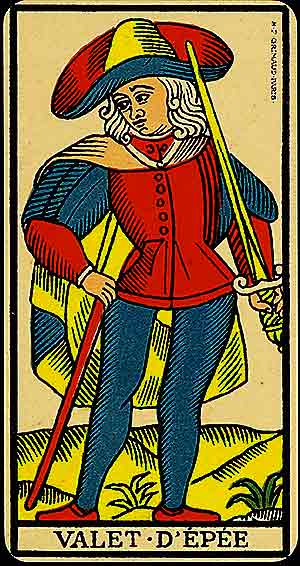 Valet of Swords |
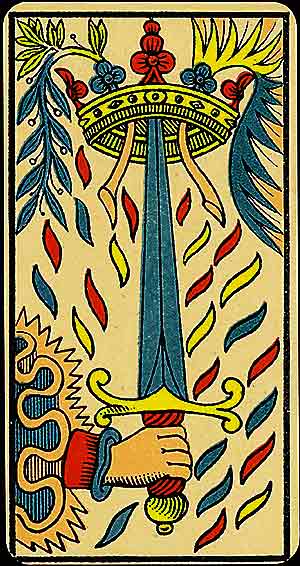 Ace of Swords |
| External Stance | 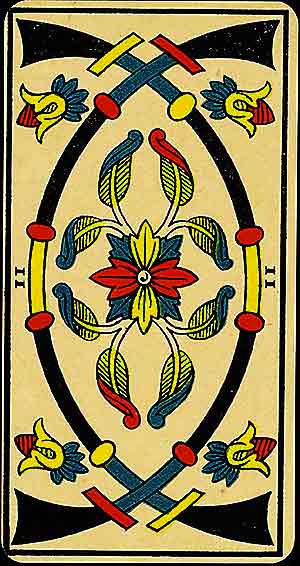 Deuce of Swords |
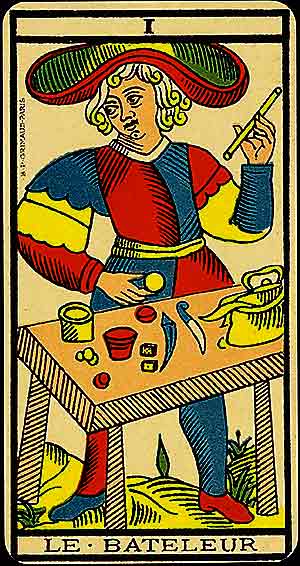 The Magician (Le Bateleur) |

The Significator
Valet of Swords
Symbolism:
The Valet of Swords is shown standing confidently, holding a sword upright or at an angle, symbolising readiness and curiosity. The figure's alert posture reflects themes of observation, intellect, and the early stages of mastering mental or communicative skills.
Meaning:
The Valet of Swords symbolises intellectual curiosity, observation, and new ideas. It encourages exploring knowledge and being open to learning. However, it also warns of hasty communication or judgment.
In relationships, it suggests a need for honest dialogue or the exploration of new dynamics. Spiritually, it represents the first steps toward understanding profound truths.
Keywords:
Curiosity, observation, new ideas, communication, learning, honesty, vigilance, intellect, youthful energy, exploration.

The Querent's Thoughts
Five of Coins
Symbolism:
Five coins create an irregular arrangement, with sparse decoration reflecting struggle or imbalance. This card symbolises financial hardship, instability, and the opportunity to find support during challenging times.
Meaning:
The Five of Coins represents financial loss, scarcity, or hardship. It reflects feelings of isolation or being "shut out" from security or comfort. However, this card also offers the reminder that help is often available if one is willing to seek it, whether in the form of external support or a change in mindset.
In relationships, it indicates feelings of neglect or abandonment. Spiritually, it encourages reaching out for support and reframing one's perspective on hardship to find hope in the darkest times.
Keywords:
Loss, scarcity, hardship, abandonment, isolation, financial struggle, poverty, lack, seeking help, resilience.

The Other Person's Thoughts
Three of Cups
Symbolism:
Three cups are arranged in a triangular pattern, adorned with flowers or vines to evoke celebration and abundance. The image suggests themes of friendship, shared joy, and communal achievements.
Meaning:
The Three of Cups represents celebration, community, and shared joy. It suggests coming together with others to honour achievements or simply enjoy the present moment. This card encourages connection, gratitude, and the recognition of shared blessings.
In relationships, it reflects harmony and support within friendships or groups. Spiritually, it emphasises the importance of shared rituals and collective growth.
Keywords:
Celebration, community, joy, friendship, gratitude, support, connection, abundance, festivity, shared blessings.

The Querent's Emotions
Deuce of Batons
Symbolism:
The Deuce of Batons in the Marseille Tarot depicts two crossed wooden batons adorned with leaves, symbolising growth, balance, and potential. The design conveys a sense of stability and duality, reflecting the initial stages of collaboration, decision-making, or planning.
Meaning:
The Two of Batons represents planning, decision-making, and the initial steps toward a goal. It emphasises the need to assess opportunities and weigh options before taking action. This card encourages foresight and a bold approach to achieving your ambitions.
In relationships, it suggests evaluating the potential for growth. Spiritually, it invites you to consider how your actions align with your higher purpose.
Keywords:
Planning, decisions, foresight, potential, ambition, exploration, preparation, boldness, vision, strategy.

The Other Person's Emotions
Ace of Swords
Symbolism:
A single, upright sword dominates the design, often crowned with laurels or floral motifs, symbolising clarity and power. This card evokes themes of mental focus, decisive action, and the emergence of truth.
Meaning:
The Ace of Swords signifies a breakthrough, clarity of thought, or the beginning of intellectual endeavours. It heralds a new phase where truth, logic, and reason will guide your actions. This card encourages decisiveness, honesty, and a commitment to facing challenges with integrity.
In relationships, it may suggest open communication or a new understanding. Spiritually, it represents cutting through illusions to achieve enlightenment.
Keywords:
Clarity, breakthrough, truth, mental focus, logic, decisiveness, honesty, intellectual pursuit, triumph, communication.

The Querent's External Stance
Deuce of Swords
Symbolism:
Two crossed swords create a balanced yet tense composition, often adorned with small floral elements to soften the imagery. The card suggests duality, decision-making, and the need to find equilibrium amidst opposing forces.
Meaning:
The Two of Swords represents a choice or dilemma requiring balance and thought. It suggests being caught between opposing forces or avoiding a decision. This card encourages you to confront the truth and rely on logic and intuition to find resolution.
In relationships, it highlights communication blockages or an emotional impasse. Spiritually, it urges you to find balance within opposing energies.
Keywords:
Indecision, stalemate, balance, choice, reflection, mental conflict, neutrality, avoidance, logic, resolution.

The Other Person's External Stance
The Magician
(Le Bateleur)
Symbolism:
The Magician is a youthful figure standing behind a table, holding a wand aloft while other tools lie before him—often a coin, a cup, and a sword. These tools represent mastery over the elements and the power to manifest intentions. His hat, shaped like a lemniscate, symbolises infinite potential, and his posture suggests readiness and action. The vibrant colours of his attire evoke creativity, energy, and a zest for life.
Meaning:
The Magician represents the power of initiative, skill, and resourcefulness. He embodies the ability to turn ideas into reality, combining intellect, action, and willpower. The card often signals the beginning of a new venture or opportunity, where focus and confidence are key. However, it also serves as a warning to avoid manipulation or overconfidence.
The Magician invites you to be aware of your tools and talents, urging you to act with intention. It also reminds you that success depends on your ability to harmonise thought and action.
Keywords:
Initiative, manifestation, skill, potential, confidence, willpower, beginnings, resourcefulness, action, focus.
